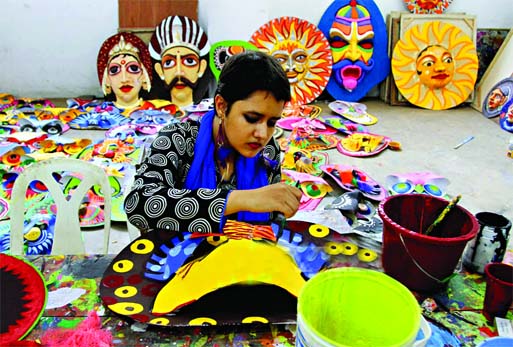
Tareen Rahman :
The nation will celebrate Pahela Baishakh, the first day of Bangla New Year 1422, on Tuesday amid traditional festivities and enthusiasm with pledge to build Bangladesh a prosperous country.
Different cultural groups will render songs and stage performances in capital Dhaka and other cities and towns across the country. The tradition to celebrate the day has been continuing since Mughal Emperor Akbar’s time.
The whole capital will turn into a ‘city of joy’ as millions of people, irrespective of age and gender, will come out to the streets attired in colourful dresses with the rising of sun on the horizon.
The Ramna Batamul in Dhaka draws the major crowd of the New Year celebrations as ‘Chhayanaut’ and other cultural groups render songs there with traditional functions staged since morning.
Security blanket will be thrown over the city’s Ramna Park, Suhrawardy Udyan, Central Shaheed Minar, Dhaka University, Shahbagh and Dhanmondi. Dog and bomb squads of different law enforcement agencies will be deployed at different parts of the city, especially in the Ramna Park and Dhaka University area to avert any untoward incident.
Police in plainclothes and RAB men with sniffing dogs are set to keep a sharp vigil as people will flock into different city parks to celebrate the day.
The men in traditional paijama and punjabi and women in white and red saris will join the celebrations along with children in colourful dresses, streaming through Dhaka streets as the first light of the sun rises in the Bengali New Year.
Small traders in their makeshift shops of handicraft items at Suhrawardy Udyan and on the roads stretching from Jatiya Press Club to Shahbagh, and on the roads surrounding Ramna Park and Baily Road are making specially designed items to sell those on that special day.
According to traditional practices, particularly in rural Bangladesh, it is still customary to clear all dues on the last day of the Bengali month Chaitra with businessmen opening “halkhata” or new book of accounts in their shops on Pahela Baishakh.
The people gorge themselves on Bengali delicacies of ‘panta bhat’ (rice soaked in water) and fried Hilsa and pepper at home and other places of Baishakhi congregations, the major ones being in the capital’s Ramna Batamul and on the Dhaka University campus.
Students of the Institute of Fine Arts of Dhaka University are preparing colourful masks and they will bring out a `Mangal Shobhajatra’ in the morning as part of the carnival.
Bangladesh Small and Cottage Industries Corporation (BSCIC) in cooperation with Bangla Academy are arranging a traditional and colourful Baishakhi Mela.
Along with traditional Nagor dola rides, other items of attraction in the mela are hand painted potteries, handmade taal pakha, flutes for small children, an array of colourful bangles and other jewelleries.
Speaking to this correspondent, small traders like pottery makers, who are preparing many artful items to do brisk business on that day, said that they had already completed preparations to meet the customers’ demand for Baishakh.
Owners of reputed fashion houses said, “Over the years, Baishakh became the second biggest event for the country’s thousands of boutiques after Eid-ul-Fitr. We are getting good sales on the eve of Pahela Baishakh since the political environment is gradually improving.”
Improved diet will be served in jails, hospitals and orphanages on the first day of the year. All museums and historical sites will remain open on the day for the students, children and disabled children for visit without ticket.
National newspapers will bring out special supplements, while Bangladesh Television, Radio Bangladesh and other private channels will air special programs highlighting the significance of the day.

